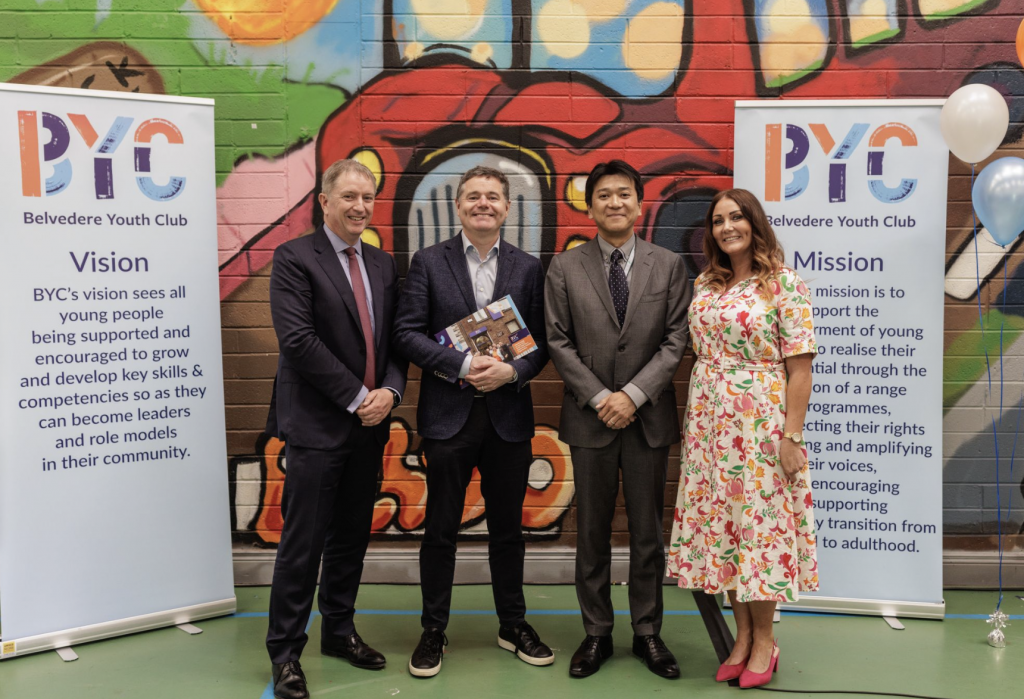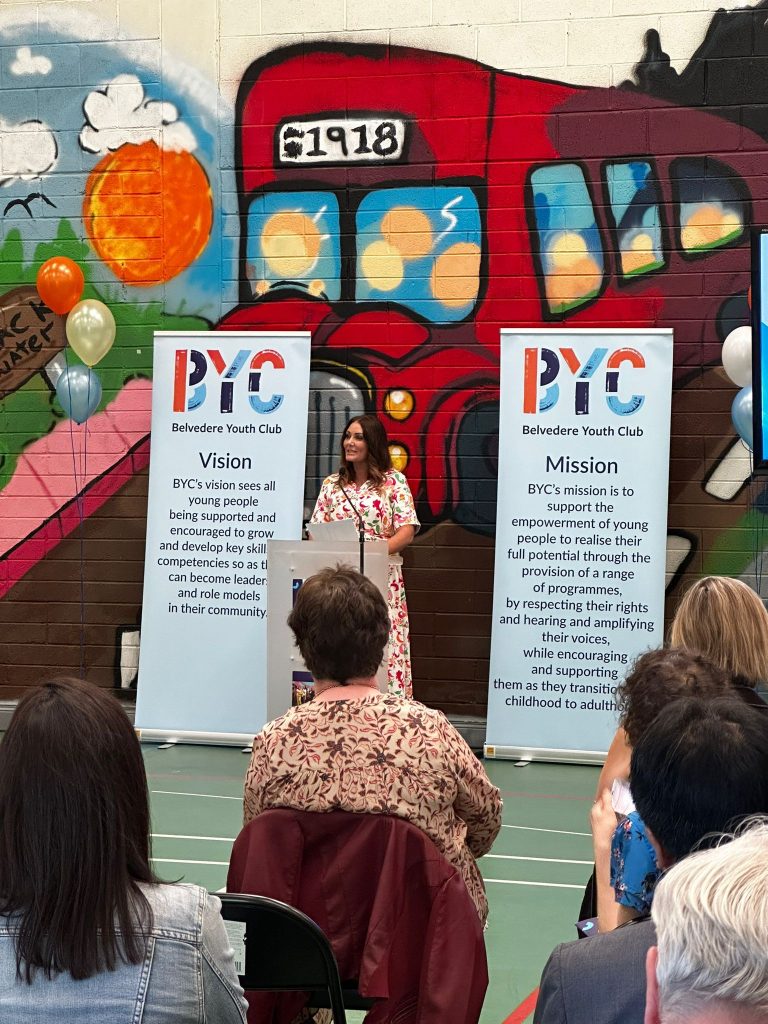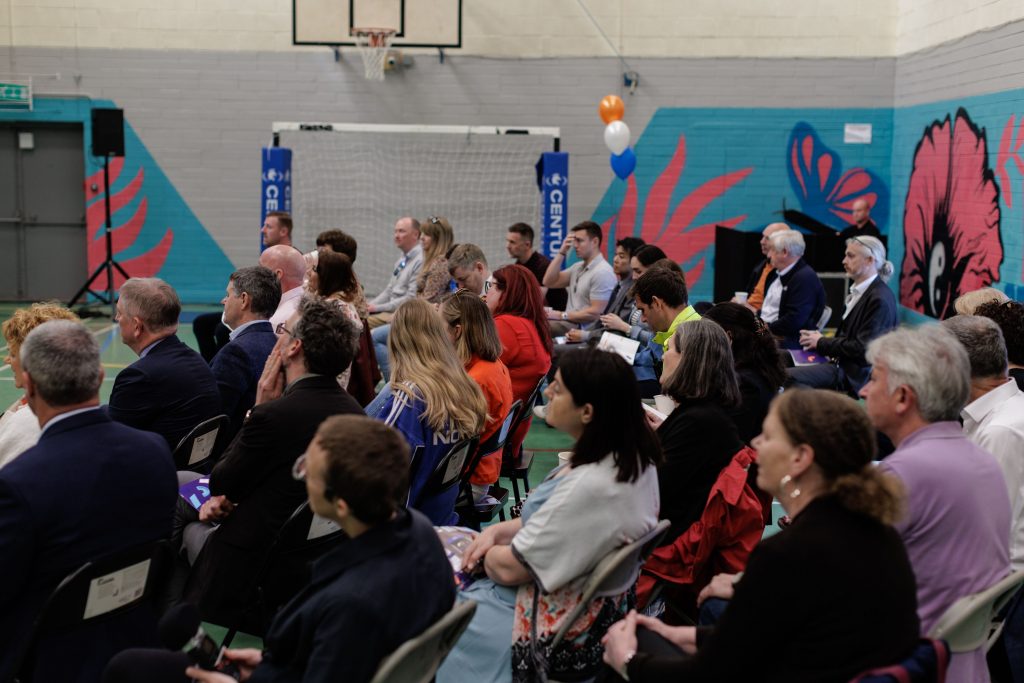On Friday 26th May, Belvedere Youth Club launched its Restorative Practice Strategy, inviting all the stakeholders engaged in the process since it started in 2019: all the BYC team, funders, supporters, advisers, local representatives and the broader community of North East Inner City. It was attended by Paschal Donohoe, Minister for Public Expenditure, National Development Plan Delivery and Reform. The launch celebrated an essential milestone in the project rather than its start. As Darragh from the BYC board of directors stated: “It celebrates the end of the beginning!” It was an opportunity to reflect on the work done, express deep gratitude to all involved and look forward to the next steps.
BYC RP project would not have been possible without the support of two main funding actors, the Community Foundation Ireland (CFI), represented by its CEO Denise Charlton and SMBC Aviation Capital, whose chairman, Nori Hiruta, CEO, Peter Barrett and SVP Environment Social Governance, Orla Benson, were in attendance. CFI’s role is to link community projects with corporate funders: they enabled BYC and SMBC Aviation Capital to partner so that BYC can fund its RP Strategy and become a Restorative Hub in the community.

Peter Barrett, Minister Donohoe, Nori Hiruta and Jenny Courtney
The BYC Restorative Practice Strategy document can be accessed here. It is essential to say that BYC is the first Youth Club in Ireland to aim at holistically becoming a Restorative Hub in the community.
We want to highlight a few powerful points made by the various speakers, Andrew Condon, Chair of BYC board, Peter Barrett, SMBC Aviation CEO, Orla Benson, Denise Charlton, Minister Donohoe, Jenny Courtney, BYC CEO and James Bowes, RP coordinator.
A restorative partnership
First, this project illustrates the power of philanthropic engagement from corporate partners. All acknowledged their gratitude to SMBC Aviation Capital for their commitment, perseverance, care and openness, especially during the pandemic and when the war in Ukraine started. At a time when many partners would have been tempted to withdraw their support, they did not. Their engagement significantly impacts a community like BYC at the heart of North Inner City, supporting young people facing many challenges. Interestingly, SMBC representatives highlighted the project’s impact on the organisation: by learning about RP and meeting Transition Year students involved in BYC, SMBC staff were reminded of the importance of relationships, of checking in with teammates and caring for each other. As Orla said: “The most important thing you can give to your colleagues is to make the workplace a better place”. SMBC Aviation Capital is a better company for having had this experience. CFI’s role in catering for the different stakeholders’ ambitions and needs has been essential, and it was heart-filling to hear Denise Charlton sharing how much this specific project was close to her heart.

Jenny talking to the audience
A holistic approach
All praised the holistic dimension of the project. If a good part of the funding was used to refurbish the building previously described as “grim and dark”, it was not only about the premises but holistically about how everything is done in the organisation with the hope that young people will bring the restorative ethos in their wider community. Jenny powerfully reminded the audience of the journey it had been for the staff: the vulnerability, honesty and openness to change it required, the growing trust they experienced, but also how difficult it had been some time to keep the lines of communication open. Change is not easy, especially when a world pandemic has fractured relationships, as James shared. Inclusivity is at the heart of a project, and each voice needs to be heard. There is a meaningful symbolic parallel between the building of a lift on the premises, which makes it accessible to all, and the empowerment of young people and staff, which restorative approaches foster.

Empathy and relationships
Restorative practices are all about building and maintaining healthy and caring relationships, the core of the RP BYC model. The launch was an expression of this: everyone in the room had made some steps and efforts to build a meaningful relationship with one another, despite the different backgrounds, ambitions, interests and walks of life. Empathy made possible the togetherness such a mixed crowd of people experienced on the day, and all referred to it. RP enhanced our ability to understand each other and share our contrasted experiences of the world. It is the way forward to build a better life and society for the wider BYC community.
New blog
We are starting this blog documenting the BYC RP project to mark the launch. It will cover a wide range of relevant topics, such as:
- The RP BYC model
- RP and youth work
- Implementing RP
- Sustaining RP
- RP Training
- Relationships and inclusivity
- Partnerships and outreach
- RP and Restorative Justice
Articles will be based on board members, staff and young people’s testimonies and stories. However, it’s important to note that it does not have the ambition of an academic research project. It is about telling our story and sharing our learnings with other organisations interested in restorative approaches.

